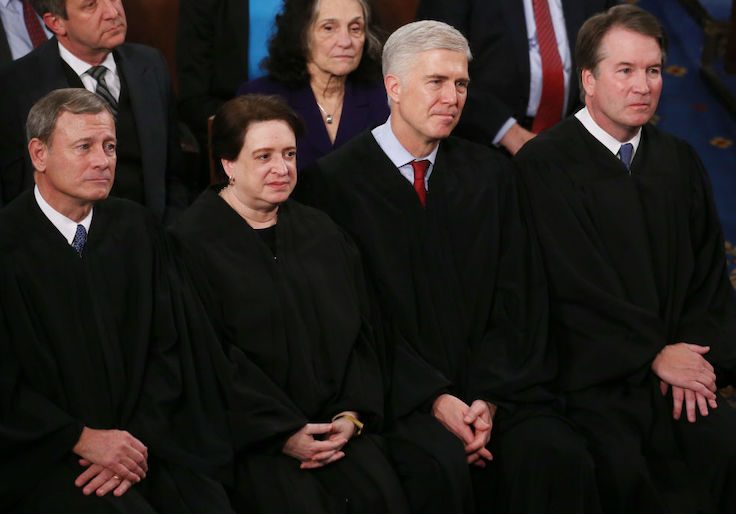The Supreme Court late Monday night restored Alabama's congressional district map for the upcoming midterm elections, an unwelcome sign for Democrats who hope to add more majority-minority districts across the South.
In a five-to-four decision, the Court ruled in favor of the state, which says it can't adopt the map proposed by civil rights groups without cleaving the state in senseless ways. The civil rights groups said Alabama's congressional map dilutes black voting power, and a federal trial court ruled in their favor on Jan. 24, ordering the state to include two majority-black districts instead of one.
Chief Justice John Roberts joined the liberal trio in dissent. Monday's decision was issued on an emergency basis, and arguments will follow sometime in the fall.
Monday's decision is a sign the Court will curtail Democrat-backed civil rights challenges to new district lines across the country, at least until after November's midterm elections. A few justices indicated that it's too late to tinker with district lines for 2022, with filing deadlines passed and primary elections approaching. And the Court will use the Alabama case to offer new guidance on the use of race in redistricting later this year, a discouraging prospect in the eyes of Democrats.
Democrats hoped to use their trial court victory in Alabama as a template for securing additional minority-majority seats in Georgia, Louisiana, Texas, and South Carolina. Those efforts appear less promising after Monday night's decision.
As Democrats press to expand a minority footprint in the south, they're under fire for gamesmanship in other parts of the country. The Washington Free Beacon reported Tuesday that a coalition of Republican voters is suing New York governor Kathy Hochul (D.) and accusing Democrats of splintering Republican-leaning Orthodox Jewish communities in New York City.
The Alabama plaintiffs argued the federal Voting Rights Act requires the state to draw two minority opportunity districts, rather than one. Though a quarter of the state's population is black, Alabama's seven-member congressional delegation has only one black member. The plaintiffs said a second district could be drawn by connecting black voters in coastal Mobile with rural black communities into the central, rural part of the state.
Lawyers for Alabama said the legislature did its best to keep the map as close as possible to the lines drawn in 2010 and 2000. The Justice Department approved both maps. Prior to 2013, redistricting in Alabama was subject to federal supervision because of its history of race discrimination. The Constitution requires the states to redraw their congressional district lines after the decennial census.
A trial court in Alabama sided with the plaintiffs, prompting the state's appeal to the Supreme Court.
The Court did not give reasons for Monday's decision, but Justice Brett Kavanaugh in a concurring opinion offered some insight on the internal deliberations. He argued that changing the district lines at this stage would confuse voters, disrupt campaigns, and put undue pressure on administrators. Filing deadlines loom, absentee voting for the May 24 primaries will begin in March, and candidates need to have fair notice as to district boundaries, he wrote. Justice Samuel Alito joined Kavanaugh's opinion.
"When an election is close at hand, the rules of the road must be clear and settled," Kavanaugh wrote. "Late judicial tinkering with election laws can lead to disruption and to unanticipated and unfair consequences for candidates, political parties, and voters, among others."
Kavanaugh's argument will resonate in different states. It especially bears in places like Florida, which has yet to finalize redistricting plans and will have a very small window between the conclusion of redistricting and the start of the campaign season.
A coalition of 14 states that support Alabama added in an amicus brief that the 2020 census took even longer than usual because of the pandemic. That means redistricting is taking place on an abbreviated timeline, and speed is of the essence.
"What is happening here does not bode well for other states who have not yet completed their work," the brief reads. "In the unique context of the 2022 redistricting cycle, this Court should instruct federal courts that the census delays are an additional factor to weigh against preliminary injunctions challenging adopted maps in the 2022 election cycle."
The Alabama plaintiffs grounded their lawsuit in Section 2 of the Voting Rights Act. Under that provision, it's illegal to draw lines that give "minorities less opportunity than other members of the electorate to participate in the political process and to elect representatives of their choice."
Some states say Section 2 puts them in a difficult position when redistricting. While Section 2 requires states to protect minority representation, the Constitution forbids them from making race a priority when setting district boundaries. Complying with both requirements can be tricky, and the Court will likely provide new guidance on doing so when it hears the Alabama case in full later this year.
Chief Justice John Roberts acknowledged as much in a short dissent, but he said the Court should have stuck with the trial court's plan for the time being.
"It is fair to say that [the Court's precedents] have engendered considerable disagreement and uncertainty regarding the nature and contours of a vote dilution claim," he wrote.
Justice Elena Kagan faulted the majority for staying the panel decision without a hearing, reviving a debate about the Court's emergency procedures. And she accused the majority of battering the Voting Rights Act, as she has in prior cases.
The case is No. 21A375 Merrill v. Milligan.
